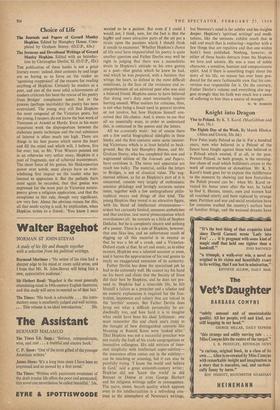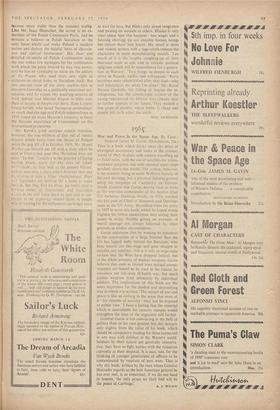Knight into Dragon
The Eighth Day of the Week. By Marek Hlasko. (Allen and Unwin, 10s. 6d.) FEW Poles study Poland as she is. For a hundred years, men who believed in a Poland of the future have fought against those who believed in a Poland which existed, if at all, in the past. Present Poland, to both groups, is the meaning- less chaos of mud which bulldozers create in the work of construction or demolition. Mr. K. S. Karol's book goes far to explain this indifference to the moment by showing just how featureless the Polish present can be : when Mr. Karol re- visited his home town after the war, he failed to find it. Houses, streets, men and women had all vanished utterly and been replaced by strange ones. Partition and war and social revolution have for centuries washed the country's surface bare of familiar things, and the national dreams have become more stable than the national reality. Like Mr. Isaac Deutscher, the writer is an ex- member of the Polish Communist Party, and he 'remains a believer' in Polish Socialism as the only force which can make Poland a modern nation and destroy the baleful 'heirs of chauvin- ism and clerical- intolerance.' His clear and detailed ch:-oniele of Polish Communism since the war makes few apologies for the ruthlessness with which the party levered its way into power, and he has no sympathy to waste on the editors of Po .Prostu who used their new right of criticism to shoot holes in Socialism itself. But this .internal view of the story enables him to interpret Gomulka as a politically consistent per- sonality, and he relates this puzzling mixture of bold 'patriot' and Marxist dragon to older con- flicts of loyalty in the pre-war party. Rosa Luxem- bourg herself, who hated 'bourgeois nationalism' so much that she opposed Polish independence in 1919, hated yet more Moscow's tendency to force the Russian experience of Communism on the international proletariat.
Mr. Karol's good analyses cannot translate, however, the true wildness of that yell of cosmic despair which burst from the throat of Boland when the gag fell off in October, 1956. Mr. Marek 1-14;sko got himself cut off with a zloty when he said in France last year 'that `Rocialism does not exist.' To him, 'socialism is the practice of laying littlun hearts waste for 'the sake of future tl'■•■••rdash he does look at the present Poland, and he sees only a place which destroys love and tr. ,e;''orms it into a bitter vindictiveness. Piotr
Agnieszka are looking for a room to make love in, but they find no place, no room, only a h'.leous series of frustrations and brutalities
;1iL!11 in the end force them to part and to sur•
to the depravity around them. A people waiting for the millennium no longer cares
to wait for love, but thinks only about vengeance and passing on wounds to others. Hlasko is very clear about how this happens: low wages and a housing shortage do not ennoble human beings but distort them into beasts. His novel is short and violent, written with a rage which reduces the characters to mere demonstrating models. Too much of it is the lengthy coughing-up of their lacerated souls in talk and in vitriolic political epigrams which will be remembered for a genera- tion in Warsaw : `Two ,things tie people to each other in Poland—vodka and exhaustion,' Party ' members were rehabilitated after they died—who will rehabilitate me while I'm alive?' Mr. Karol blames Gomulka for failing to inspire the in- telligentsia. but the considerable section of the young represented by l-t!asko was already deaf to further appeals to the future. They wanted a few years of present, where butter is cheap and people tell each other the truth.
NLAL ,1SCIIERSON



































 Previous page
Previous page